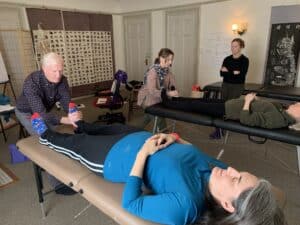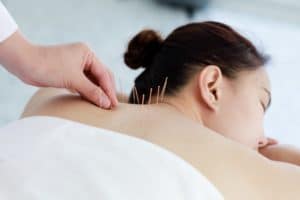Parkinson’s disease affects the brain, with symptoms developing over time that impairs balance, coordination, speech, and movement. As neurons in the portion of the brain controlling movement suffer damage, they produce less dopamine, and Parkinson’s symptoms start to appear. Currently, scientists do not know what causes these cells to deteriorate; while there is no cure, certain treatments and therapies can reduce and relieve common symptoms. Recently, clinical research has begun to identify the benefits of acupuncture treatment for providing effective and lasting relief from many Parkinson’s symptoms.
Parkinson’s Disease Risk Factors and Symptoms
Although the root cause of Parkinson’s disease remains unknown, medical researchers recognize that symptoms commonly arrive in individuals over 60. However, between five to ten percent of those with Parkinson’s develop around the age of 50. Parkinson’s disease affects more men than women, and it appears that many forms of Parkinson’s—particularly early-onset—are inherited. People suffering from depression tend to be at greater risk of developing Parkinson’s disease. Parkinson’s disease has four primary symptoms: tremors in the hands, arms, legs, jaw, or head; stiffness in the extremities and trunk; slowed movement; and impaired balance and coordination. Initially, symptoms may affect one side of the body and progress to impair both sides.
Western Treatments and Unwanted Side Effects
For Western doctors, the most common approach to manage symptoms of Parkinson’s disease is through medications. Pharmaceutical drugs that elevate dopamine levels in the brain and control nonmotor symptoms are commonly prescribed. One common medication, levodopa, helps nerve cells produce dopamine. However, levodopa often carries significant side effects, such as nausea, vomiting, restlessness, and low blood pressure, so doctors may also prescribe carbidopa to reduce the severity of these side effects. Should someone stop taking levodopa suddenly, serious side effects may result, such as difficulty breathing or immobilization. Although these drugs may minimize symptoms of Parkinson’s disease, many people express concern over these unwanted side effects and the overall impact on their long-term health.
How Acupuncture Can Relieve Parkinson’s Symptoms Naturally
Recently, Western medicine has started to explore the potential benefits of acupuncture therapy for those with Parkinson’s disease. While more comprehensive studies are needed to understand the scope of this treatment option, the existing research holds promise. According to a 2021 review and meta-analysis, “acupuncture may reduce neurodegeneration of dopaminergic neurons and regulate the balance of the dopaminergic circuit, thus delaying the progression of the disease,” especially if treatment occurs during the disease’s earlier stages. Another meta-analysis and qualitative review concluded that “acupuncture-related therapies combined with conventional medication may benefit individuals with [Parkinson’s],” and a third systematic review and meta-analysis echoed these findings.
Additionally, “acupuncture could relieve such specific pain in patients with [Parkinson’s disease] by modulating several regions of the brain related to both sensory-discriminative and emotional aspects,” according to a 2019 study. As depression is a known risk factor for developing Parkinson’s, one retrospective study determined that “the incidence of PD was lower among patients with depression who received acupuncture treatment than among those patients who did not.” Acupuncture encourages the body to heal itself, stimulating the production and release of essential neurotransmitters like dopamine to minimize painful symptoms and potentially slow the progression of degenerative diseases such as Parkinson’s.
Schedule an appointment with a Portland acupuncturist today by calling Inner Works Acupuncture at (503) 227-2127.




